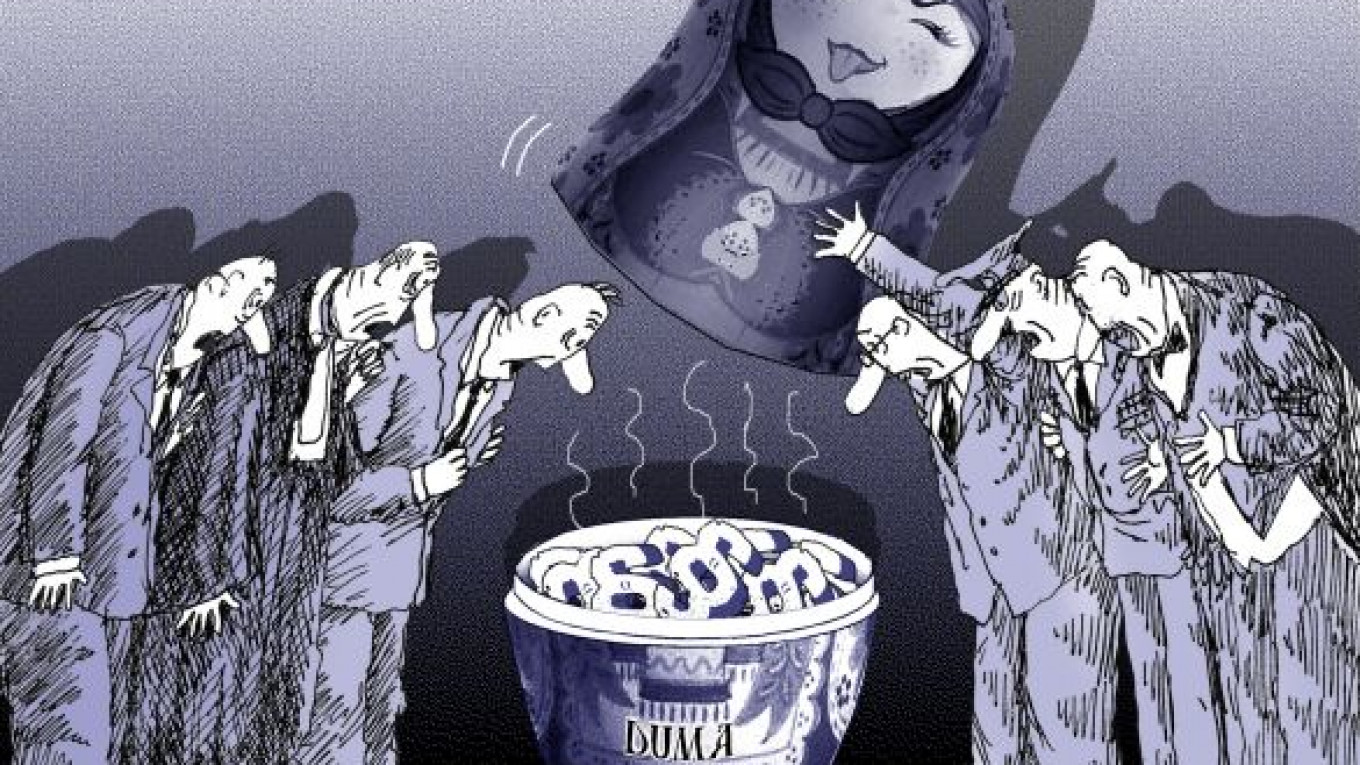The second half of 2012 was marked by an onslaught of reactionary legislative initiative in Russia. Legislators passed a number of laws that the liberal segment of society viewed as a direct reaction to the mass protest rallies held throughout 2012.
At first glance, this would seem like overkill given the fact that the protest movement has fizzled out and that the regime is not in any imminent danger. The opposition has been largely discredited in the eyes of the public due in part to the successful series of special operations the authorities waged against it, such as broadcasting smear campaigns on television. But it is also because of the opposition's inability in recent months to put forward a coherent platform and plan of action or to demonstrate even a basic level of cohesion and organization. In the eyes of most Russians, many leading opposition figures, as well as the movement's Coordinating Council, do not represent the people, and there is little faith that the opposition leaders can ever coerce the Kremlin to adopt any of their demands. Moreover, there is little faith that they would be effective rulers even if they were able to replace the current regime through democratic methods.
At the same time, however, the authorities need to focus attention on more constructive tasks such as improving the investment climate and improving the effectiveness of public institutions. In particular, the Russian delegation to the World Economic Forum in Davos can be considered to have, at best, failed in proving that this country is attractive for large-scale foreign investment. The vast majority of forum participants were in agreement that Russia must improve the work of its institutions and tackle corruption. Even Prime Minister Dmitry Medvedev's statements were disappointing for many of those present. The impression was that the Russian leadership lacks not only new ideas but also any form of a comprehensive strategy for developing the country.
Instead of pumping out ridiculous, populist laws, President Vladimir Putin and the State Duma should focus on adopting tough, across-the-board measures to fight corruption, developing policies to spur economic growth, diversifying the economy and reducing Russia's dependence on oil and gas exports. Putin should also focus on his campaign promise and presidential decree to achieve gross domestic product growth of 5 percent or more annually.
Now taking center stage is a law banning the display of "homosexual propaganda" to minors. That was the follow-up to an equally bizarre law banning U.S. citizens from adopting Russian orphans, intended as retaliation for the U.S. Magnitsky Act. The Liberal Democratic Party has sponsored another bill that would ban the use of "Americanisms" and other foreign words. Consideration is also being given to several bills that would ban the use of obscene words in public places, with some versions including sanctions against their use in the media.
Another bill introduced over the New Year's holidays would tighten the residence registration rules for Russians, which was presented as a way to fight illegal immigration. This will complicate the lives of millions of Russians as they travel or move within the country, but it will do nothing to accelerate economic growth.
The public is being drawn into a discussion of irrelevant problems that will do nothing to resolve the far more pressing need for economic and social development. But the conservative segment of society enjoys all the noise it is creating by supporting these initiatives. The Russian Orthodox Church only adds fuel to this fire, and it becomes clear that the authorities are simply manipulating the passions of the most uneducated and backward members of society. But even this tactic is based on meaningless propaganda about prohibiting officials from owning property overseas — a restriction that can easily be circumvented — and warding off the looming threat of homosexuals, pedophiles and U.S. citizens who dream of torturing Russian children.
Yet behind this thick cloud of populism and demagoguery, there is not even a hint of a clear strategy for developing the country. On the contrary, the government's nod to the country's reactionary forces will only embolden the most ignorant and obscurantist segments in society, making the political dialogue in Russia resemble a Communist Party meeting in a madhouse.
Somebody in the Kremlin must have thought that this approach would consolidate the ruling elites, revive patriotism and strengthen moral rectitude. But besides scoring cheap political points, what will be achieved? Where is the social and economic policy in the name of which all these prohibitive laws were passed? What type of society and economy are the authorities hoping to create with these measures?
The most important question that needs to be posed directly to lawmakers is: How will the battle against homosexuals, U.S. adoptive parents and foreign agents help Russia diversify its economy and boost its GDP?
Georgy Bovt is a political analyst.
Related articles:
A Message from The Moscow Times:
Dear readers,
We are facing unprecedented challenges. Russia's Prosecutor General's Office has designated The Moscow Times as an "undesirable" organization, criminalizing our work and putting our staff at risk of prosecution. This follows our earlier unjust labeling as a "foreign agent."
These actions are direct attempts to silence independent journalism in Russia. The authorities claim our work "discredits the decisions of the Russian leadership." We see things differently: we strive to provide accurate, unbiased reporting on Russia.
We, the journalists of The Moscow Times, refuse to be silenced. But to continue our work, we need your help.
Your support, no matter how small, makes a world of difference. If you can, please support us monthly starting from just $2. It's quick to set up, and every contribution makes a significant impact.
By supporting The Moscow Times, you're defending open, independent journalism in the face of repression. Thank you for standing with us.
Remind me later.







